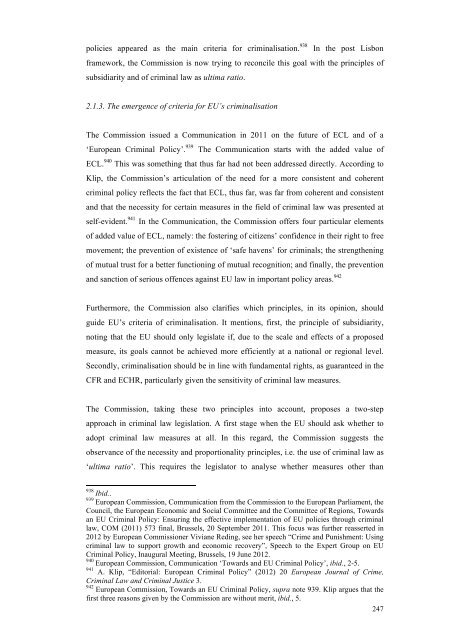The evolution of European Union criminal law (1957-2012)
The evolution of European Union criminal law (1957-2012)
The evolution of European Union criminal law (1957-2012)
Create successful ePaper yourself
Turn your PDF publications into a flip-book with our unique Google optimized e-Paper software.
policies appeared as the main criteria for <strong>criminal</strong>isation. 938 In the post Lisbon<br />
framework, the Commission is now trying to reconcile this goal with the principles <strong>of</strong><br />
subsidiarity and <strong>of</strong> <strong>criminal</strong> <strong>law</strong> as ultima ratio.<br />
2.1.3. <strong>The</strong> emergence <strong>of</strong> criteria for EU’s <strong>criminal</strong>isation<br />
<strong>The</strong> Commission issued a Communication in 2011 on the future <strong>of</strong> ECL and <strong>of</strong> a<br />
‘<strong>European</strong> Criminal Policy’. 939 <strong>The</strong> Communication starts with the added value <strong>of</strong><br />
ECL. 940 This was something that thus far had not been addressed directly. According to<br />
Klip, the Commission’s articulation <strong>of</strong> the need for a more consistent and coherent<br />
<strong>criminal</strong> policy reflects the fact that ECL, thus far, was far from coherent and consistent<br />
and that the necessity for certain measures in the field <strong>of</strong> <strong>criminal</strong> <strong>law</strong> was presented at<br />
self-evident. 941 In the Communication, the Commission <strong>of</strong>fers four particular elements<br />
<strong>of</strong> added value <strong>of</strong> ECL, namely: the fostering <strong>of</strong> citizens’ confidence in their right to free<br />
movement; the prevention <strong>of</strong> existence <strong>of</strong> ‘safe havens’ for <strong>criminal</strong>s; the strengthening<br />
<strong>of</strong> mutual trust for a better functioning <strong>of</strong> mutual recognition; and finally, the prevention<br />
and sanction <strong>of</strong> serious <strong>of</strong>fences against EU <strong>law</strong> in important policy areas. 942<br />
Furthermore, the Commission also clarifies which principles, in its opinion, should<br />
guide EU’s criteria <strong>of</strong> <strong>criminal</strong>isation. It mentions, first, the principle <strong>of</strong> subsidiarity,<br />
noting that the EU should only legislate if, due to the scale and effects <strong>of</strong> a proposed<br />
measure, its goals cannot be achieved more efficiently at a national or regional level.<br />
Secondly, <strong>criminal</strong>isation should be in line with fundamental rights, as guaranteed in the<br />
CFR and ECHR, particularly given the sensitivity <strong>of</strong> <strong>criminal</strong> <strong>law</strong> measures.<br />
<strong>The</strong> Commission, taking these two principles into account, proposes a two-step<br />
approach in <strong>criminal</strong> <strong>law</strong> legislation. A first stage when the EU should ask whether to<br />
adopt <strong>criminal</strong> <strong>law</strong> measures at all. In this regard, the Commission suggests the<br />
observance <strong>of</strong> the necessity and proportionality principles, i.e. the use <strong>of</strong> <strong>criminal</strong> <strong>law</strong> as<br />
‘ultima ratio’. This requires the legislator to analyse whether measures other than<br />
938 Ibid..<br />
939 <strong>European</strong> Commission, Communication from the Commission to the <strong>European</strong> Parliament, the<br />
Council, the <strong>European</strong> Economic and Social Committee and the Committee <strong>of</strong> Regions, Towards<br />
an EU Criminal Policy: Ensuring the effective implementation <strong>of</strong> EU policies through <strong>criminal</strong><br />
<strong>law</strong>, COM (2011) 573 final, Brussels, 20 September 2011. This focus was further reasserted in<br />
<strong>2012</strong> by <strong>European</strong> Commissioner Viviane Reding, see her speech “Crime and Punishment: Using<br />
<strong>criminal</strong> <strong>law</strong> to support growth and economic recovery”, Speech to the Expert Group on EU<br />
Criminal Policy, Inaugural Meeting, Brussels, 19 June <strong>2012</strong>.<br />
940 <strong>European</strong> Commission, Communication ‘Towards and EU Criminal Policy’, ibid., 2-5.<br />
941 A. Klip, “Editorial: <strong>European</strong> Criminal Policy” (<strong>2012</strong>) 20 <strong>European</strong> Journal <strong>of</strong> Crime,<br />
Criminal Law and Criminal Justice 3.<br />
942 <strong>European</strong> Commission, Towards an EU Criminal Policy, supra note 939. Klip argues that the<br />
first three reasons given by the Commission are without merit, ibid., 5.<br />
247
















